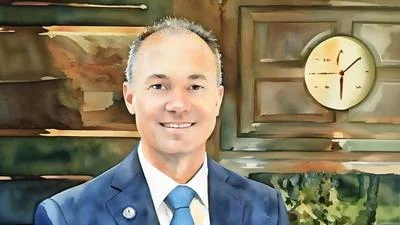Dov Lipman is a rabbi, a leader in the global movement of Jews returning to the Land of Israel, and one of the very few Americans to become a Knesset member. He is also an author and the CEO and founder of Yad L’Olim, an organization to assist new immigrants to Israel. His unlikely journey into Israeli politics began not with a grand ambition, but through an unexpected confrontation with religious extremism in the town of Beit Shemesh.
“To be in the Knesset, it wasn't even a remote possibility,” Lipman reflects. He explains that a group of religious extremists had moved into his neighborhood, creating a hostile environment by attempting to force others to adhere to their particular brand of religion. “Even though I'm religiously observant. I do believe that it's the most fulfilling, meaningful way to live life. I'm also against forcing anybody else to do so. I'd rather have them see my example and be inspired to do so.”
As he fought back against the group, Lipman became more involved in local activism, eventually appearing in the media, despite his “very broken Hebrew.” This led to political parties reaching out to him about running for office.
“I made a decision in terms of a political party to run with, which actually was not my natural political home.”
He was placed at number 17 on his party’s electoral list, which was only expected to earn five or six seats. But Lipman’s story took an unexpected turn when he found that his mother made aliyah (immigrated to Israel) so she could vote for him. “She moved to Israel so she could vote for me in the election because she wanted to have a vote. That's how much she believed this was going to happen.”
When the results came in, Lipman was shocked to learn that his party had won 19 seats, making him the first American-born Knesset member in 30 years. “There we were on election night. Thank God we won 19 seats through the second largest party in the Knesset, and I was just looking at the screens with the result and the verse from Psalms that kept coming to me from King David, ‘Hodel Hashem Kito’, to give thanks to God because he's so good.”
Now a seasoned advocate for Israel, Lipman has spent significant time speaking on behalf of the Jewish state around the world. But one early lesson was sobering. “The first thing I learned was actually negative and sad, which was, we are so alone in this world.”
Lipman has grappled with a narrative in global politics where Israel is often painted as a villain. “This country is such a beacon of light, goodness, morality, and everyone is talking about us, saying we're monsters and we're colonizers and we're occupiers,” he says.
Lipman explains why this has been difficult. "I'm having conversations … presenting facts to people in parliaments and on college campuses, and they're just not hearing me.”
Despite this, his optimism was reignited by his encounters with Christian supporters of Israel. “I realized they might not be the loudest, but my goodness, we are not alone at all."
Lipman describes a faith-based coalition of support for Israel "which is so strong and so powerful.”
He became active in the Knesset Christian Allied Caucus, a group dedicated to raising the voices of Christian supporters for Israel in parliaments worldwide. Lipman found that many Christians shared not only a political alliance with Israel but a deep spiritual connection.
For Lipman, the U.S.-Israel alliance is about more than military or political strategy—it is at its heart a faith-based relationship. “Everyone talks about it in terms of intelligence sharing, which is important,” he says, or "in terms of military alliance, which is critical." But to him, “it's about a faith-based relationship.”
The spiritual connection between Israel and the U.S. goes back to the founding fathers of the United States, who Lipman points out had “love for not just the Bible, but Hebrew...they had such a love for the Holy Land and for Israel.”
Lipman sees the U.S.-Israel alliance as a model that can become an example for the world. “Israel was founded as a very secular society by secular founders, but over 76 years, we're making our way back spiritually,” he says.
He refers to a "spiritual renaissance that's happening,” and says Israel will "reach a point where there’s going to be a majority of religious people in Israel,” resulting in "a faith-based, peaceful Israel.”
He envisions a day when both Israel and the U.S. will be seen together as spiritual leaders. “Then I imagine the U.S.-Israel alliance being a beacon of spiritual light to the world.”
When asked how Israel might bless America in the coming years, Lipman offers a unique perspective. In Israel, he says, “you see people literally everywhere with machine guns and pistols.” But, he explains, “we celebrate life and people understand that they have guns in order to protect life, not to take life.”
Lipman contrasts this with guns in the United States, where mass shootings have become tragically common. “There's something rotten to the core of a society if that's happening...So I believe that what Israel can show the world, and hopefully the United States, is what it means to be a society that celebrates life.”
He expands on the theme by pointing to Israel's technology and medical innovations. “You can go online and find out every single thing that we have brought to make the world a better place medically, technologically, in terms of the ease of life and life-saving measures,” innovations he says "that Israel is bringing to the whole world.”
His role requires him to also respond to criticism of Israel’s military actions. But he believes negative views of Israel’s current actions are distorted. “I wish people could see a picture of what it looks like in military headquarters in Tel Aviv...where every single bombardment from our air force has to be okayed by lawyers beforehand,” he says.
He shares a sobering statistic. “In a war of this kind, urban warfare, historically, there's usually nine civilians killed per combatant,” compared to "one civilian per combatant killed” in the current conflict.” he says.
Lipman calls on members of the U.S. Congress to view the US-Israel relationship through a moral and spiritual lens. “What can we do to strengthen Israel and the U.S.-Israeli relationship so that we can bring spirituality and light into the world?” he asks.
"If both countries get back to making decisions based on spirituality and godliness and morality… then unbelievable things are in the future for both of our countries and for the U.S.-Israel alliance.”
Listen to the entire interview at the following link: Ep. 10 - Dov Lipman (Israel)








